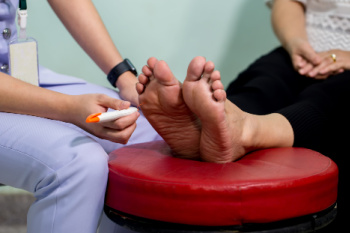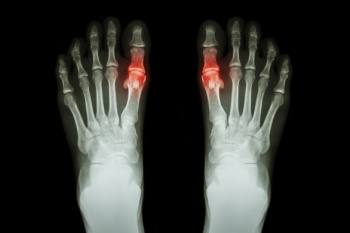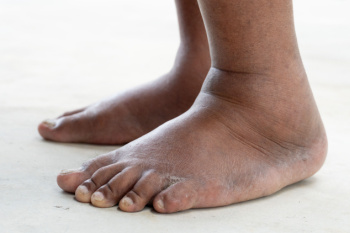Connect With Us
Blog
Items filtered by date: December 2024
Symptoms of Neuropathy in the Feet and Relief Tips

Neuropathy in the feet occurs when the nerves in the feet are damaged, leading to a variety of symptoms. Common signs include numbness, tingling, a burning sensation, and sharp pain in the feet. People with neuropathy may also experience weakness, difficulty walking, and a lack of coordination due to reduced sensation. To find relief, regular walking can help improve circulation and strengthen the feet, which may reduce symptoms. Soaking the feet in warm water with Epsom salt can soothe discomfort and ease muscle tension. Additionally, reducing alcohol consumption is helpful, as excessive drinking can worsen nerve damage and increase pain. Managing underlying conditions, such as diabetes, through proper care and medication, can also significantly help control neuropathy symptoms. If you are suffering from neuropathy in the feet, it is suggested that you make an appointment with a podiatrist for help.
Neuropathy
Neuropathy can be a potentially serious condition, especially if it is left undiagnosed. If you have any concerns that you may be experiencing nerve loss in your feet, consult with one of our podiatrists from Bangor Podiatry. Our doctors will assess your condition and provide you with quality foot and ankle treatment for neuropathy.
What Is Neuropathy?
Neuropathy is a condition that leads to damage to the nerves in the body. Peripheral neuropathy, or neuropathy that affects your peripheral nervous system, usually occurs in the feet. Neuropathy can be triggered by a number of different causes. Such causes include diabetes, infections, cancers, disorders, and toxic substances.
Symptoms of Neuropathy Include:
- Numbness
- Sensation loss
- Prickling and tingling sensations
- Throbbing, freezing, burning pains
- Muscle weakness
Those with diabetes are at serious risk due to being unable to feel an ulcer on their feet. Diabetics usually also suffer from poor blood circulation. This can lead to the wound not healing, infections occurring, and the limb may have to be amputated.
Treatment
To treat neuropathy in the foot, podiatrists will first diagnose the cause of the neuropathy. Figuring out the underlying cause of the neuropathy will allow the podiatrist to prescribe the best treatment, whether it be caused by diabetes, toxic substance exposure, infection, etc. If the nerve has not died, then it’s possible that sensation may be able to return to the foot.
Pain medication may be issued for pain. Electrical nerve stimulation can be used to stimulate nerves. If the neuropathy is caused from pressure on the nerves, then surgery may be necessary.
If you have any questions, please feel free to contact our offices located in Bangor, Gilbert, and Bethlehem, PA . We offer the newest diagnostic and treatment technologies for all your foot care needs.
How Psoriatic Arthritis Affects the Feet

Psoriatic arthritis, or PsA, often affects the feet, leading to inflammation and discomfort in the toes, ankles, and heels. Psoriatic arthritis can cause inflammation where tendons or ligaments attach to bones, commonly affecting the Achilles tendon and the plantar fascia. It also may result in dactylitis, or sausage toes, which involves swelling of the entire toe that makes walking and wearing shoes painful. Nail changes, such as pitting or separation from the nail bed, are also common with PsA. It also can lead to joint damage and deformities if left untreated, causing significant limitations in mobility. A podiatrist can provide valuable care by addressing symptoms with treatments aimed at reducing pain and inflammation. Other measures include prescribing orthotics to support affected areas and suggesting ways to help manage the condition effectively. Regular care from a podiatrist can improve comfort, prevent further joint damage, and enhance mobility. If you have foot problems related to psoriatic arthritis, it is suggested that you schedule an appointment with a podiatrist for treatment options.
Arthritis can be a difficult condition to live with. If you are seeking treatment, contact one of our podiatrists from Bangor Podiatry. Our doctors can provide the care you need to keep you pain-free and on your feet.
Arthritic Foot Care
Arthritis is a joint disorder that involves the inflammation of different joints in your body, such as those in your feet. Arthritis is often caused by a degenerative joint disease and causes mild to severe pain in all affected areas. In addition to this, swelling and stiffness in the affected joints can also be a common symptom of arthritis.
In many cases, wearing ill-fitting shoes can worsen the effects and pain of arthritis. Wearing shoes that have a lower heel and extra room can help your feet feel more comfortable. In cases of rheumatoid arthritis, the arch in your foot may become problematic. Buying shoes with proper arch support that contour to your feet can help immensely.
Alleviating Arthritic Pain
- Exercises that stretch the foot can prevent further pain and injury and increase mobility
- Most of the pain can be alleviated with anti-inflammatory drugs, heat, and topical medications
- Massages can help temporarily alleviate pain.
It is best to see your doctor for the treatment that is right for your needs and symptoms. Conditions vary, and a podiatrist can help you determine the right method of care for your feet.
If you have any questions, please feel free to contact our offices located in Bangor, Gilbert, and Bethlehem, PA . We offer the newest diagnostic tools and technology to treat your foot and ankle needs.
Heel Pain Can Be Treated!
How to Choose the Right Running Shoes for Your Individualized Style

Choosing the right running shoes is essential to enhancing performance and preventing injury. The type of running you do plays a significant role in determining the best shoe for you. If you are a long-distance runner, look for shoes that offer plenty of cushioning to absorb impact over extended periods. For speedwork or short-distance running, lightweight shoes with a more responsive feel will help improve your pace. Trail runners require shoes with durable outsoles and better grip to handle uneven, rough terrains. Consider your foot arch and pronation as well. Those with flat feet or overpronation may benefit from shoes with added support, while high arches may need shoes with more flexibility and cushioning. Proper fit is key, so make sure there is enough room in the toe box and that the shoe feels snug without causing discomfort. If you have endured a foot injury from wearing the wrong running shoes, it is suggested that you contact a podiatrist who can treat various foot conditions, and guide you on choosing the right running shoes.
If you are a runner, wearing the right running shoe is essential. For more information, contact one of our podiatrists from Bangor Podiatry. Our doctors can provide the care you need to keep you pain-free and on your feet.
Choosing the Right Running Shoe for Your Foot Type
To increase performance and avoid the risk of injury, it is important to choose the right running shoe based on your foot type. The general design of running shoes revolves around pronation, which is how the ankle rolls from outside to inside when the foot strikes the ground.
- Neutral runners are able to choose from a wide variety of shoes, including minimalist shoes or even going barefoot.
- Runners who overpronate, or experience an over-abundance of ankle rolling, should choose shoes that provide extra motion control and stability.
- Runners who underpronate, or supinate, have feet that have high arches and lack flexibility, preventing shock absorption. They require shoes with more flexibility and cushion.
If you have any questions please feel free to contact our offices located in Bangor, Gilbert, and Bethlehem, PA . We offer the newest diagnostic and treatment technologies for all your foot and ankle needs.
Understanding Gout and How Podiatrists Treat It

Gout is a type of arthritis caused by the buildup of uric acid crystals in the joints, leading to intense pain and inflammation. This condition typically affects the big toe but can involve other joints as well. Uric acid is a waste product that the body normally eliminates, but when it accumulates in excessive amounts, it can form sharp crystals that irritate the surrounding tissues. Podiatrists treat gout by first diagnosing the condition through physical exams and sometimes tests to measure uric acid levels. Treatment often involves medications to reduce uric acid levels, manage pain, and decrease inflammation. Podiatrists may also recommend lifestyle changes, such as dietary adjustments and weight management, to help prevent future flare-ups. Wearing supportive footwear and custom orthotics can also assist in alleviating pressure on the affected joints, promoting healing and comfort. If you have had one or more bouts of gout, it is strongly suggested that you are under the care of a podiatrist who can effectively treat and manage this condition.
Gout is a foot condition that requires certain treatment and care. If you are seeking treatment, contact one of our podiatrists from Bangor Podiatry. Our doctors will treat your foot and ankle needs.
What Is Gout?
Gout is a type of arthritis caused by a buildup of uric acid in the bloodstream. It often develops in the foot, especially the big toe area, although it can manifest in other parts of the body as well. Gout can make walking and standing very painful and is especially common in diabetics and the obese.
People typically get gout because of a poor diet. Genetic predisposition is also a factor. The children of parents who have had gout frequently have a chance of developing it themselves.
Gout can easily be identified by redness and inflammation of the big toe and the surrounding areas of the foot. Other symptoms include extreme fatigue, joint pain, and running high fevers. Sometimes corticosteroid drugs can be prescribed to treat gout, but the best way to combat this disease is to get more exercise and eat a better diet.
If you have any questions please feel free to contact our offices located in Bangor, Gilbert, and Bethlehem, PA . We offer the newest diagnostic and treatment technologies for all your foot and ankle needs.
Conditions That May Cause Swollen Feet

Lipedema and edema are conditions that can affect the feet, causing discomfort and swelling. Lipedema is a chronic disorder that causes abnormal fat accumulation, typically in the legs, hips, and sometimes the feet. It is often mistaken for obesity, but it is a distinct condition that does not respond well to diet or exercise. Edema, on the other hand, refers to fluid retention, which can cause swelling in the feet and ankles. Both conditions share symptoms like swelling, pain, and a feeling of heaviness, and they can be aggravated by standing for long periods of time, or wearing ill-fitting shoes. While the exact causes are not fully understood, genetic factors, hormonal changes, and poor circulation are believed to contribute. Treatment options include compression therapy, elevation, lymphatic drainage massage, and specialized footwear. A podiatrist can offer tailored treatment plans to manage symptoms, improve circulation, and relieve discomfort. If you are experiencing swelling or pain in your feet or ankles, it is suggested that you schedule an appointment with a podiatrist.
Swollen feet can be a sign of an underlying condition. If you have any concerns, contact one of our podiatrists of Bangor Podiatry. Our doctors can provide the care you need to keep you pain-free and on your feet.
Swollen feet are a common ailment among pregnant women and people who stand or sit for extended periods. Aging may increase the possibility of swollen feet and patients who are obese often notice when their feet are swelling too. There may be medical reasons why swollen feet occur:
- Phlebitis - A condition that causes the veins to become inflamed and can also cause leg pain.
- Liver disease - This may lead to low blood levels of albumin which is a protein. This can cause fluid in the blood to pass into the tissues and several areas of the body can become swollen.
- Heart failure - When the heart doesn’t pump properly the blood that is normally pumped back to the heart can pool in the veins of the legs causing swollen feet.
- Kidney disease - One of the main functions of the kidneys is releasing excess fluid in the body. This type of condition can make it difficult for the kidneys to function properly, and as a result the feet may become swollen.
- Deep-vein thrombosis (DVT)- This is a serious condition where blood clots form in the veins of the legs. They can block the return of blood from the legs to the heart which may cause the feet to swell. It is important to be treated by a podiatrist if this condition is present.
Swollen feet can also be caused by bone and tendon conditions, including fractures, arthritis, and tendinitis. Additionally, there may be skin and toenail conditions and an infection may cause the feet to swell. Patients who take medicine to treat high blood pressure may be prone to getting swollen feet.
Many patients elevate their feet to help relieve the swelling and this is generally a temporary remedy. When a podiatrist is consulted the reason behind the swelling can be uncovered and subsequently treated.
If you have any questions please feel free to contact our offices located in Bangor, Gilbert, and Bethlehem, PA . We offer the newest diagnostic tools and technology to treat your foot and ankle needs.
Blog Archives
- March 2025
- February 2025
- January 2025
- December 2024
- November 2024
- October 2024
- September 2024
- August 2024
- July 2024
- June 2024
- May 2024
- April 2024
- March 2024
- February 2024
- January 2024
- December 2023
- November 2023
- October 2023
- September 2023
- August 2023
- July 2023
- June 2023
- May 2023
- April 2023
- March 2023
- February 2023
- January 2023

